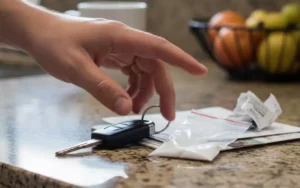Maybe you only use cocaine once in a while: at a party, with friends, or when life feels overwhelming. It might seem harmless because it’s not every day. But even infrequent use can slowly shift into something harder to control.
If you’ve started to wonder whether your “occasional” use might be doing more harm than you thought, you’re not alone. Many people who reach out for help started in the same place: using just sometimes, thinking they had it handled. The truth is, cocaine changes how your brain works, even when it’s used sporadically. Knowing the signs early can make all the difference.
What Counts as Sporadic or Occasional Cocaine Use?
Sporadic use usually means taking cocaine only on certain occasions, like weekends, special events, or stressful days. It might not feel like a pattern at first. But your brain doesn’t know the difference between “every day” and “every now and then.”
According to research from the National Institute on Drug Abuse (NIDA), even small, occasional doses of cocaine can trigger changes in brain chemistry related to pleasure and impulse control. Over time, it becomes easier to crave that same high, even if you promised yourself you’d only do it “once in a while.”
In New Hampshire, cocaine-related overdoses have jumped by more than 30% in recent years. Many of those cases involved people who thought their use was casual.

If you’re curious about how cocaine amounts are measured, check out this helpful breakdown on how many grams are in an 8 ball of cocaine. It’s eye-opening to see how much is often used in one session.
Sporadic cocaine use may seem harmless, but even infrequent use can trigger powerful changes in the brain that lead to dependence. Occasional use carries serious health and emotional risks, from heart problems to anxiety and mood swings. Recognizing the early signs can help you seek support before addiction takes hold.
Health Risks of Occasional Cocaine Use
Even “every now and then” use can put a serious strain on your body. Cocaine spikes your heart rate and blood pressure, which can trigger heart attacks or strokes, even in healthy people.
Other short- and long-term effects may include:
- Irregular sleep patterns
- Weight loss and appetite changes
- Persistent anxiety or restlessness
- High blood pressure and heart problems
The Centers for Disease Control and Prevention (CDC) reports that many ER visits for cocaine complications involve people who said they used infrequently. The body doesn’t forget exposure just because it’s occasional.
If you’re starting to notice physical changes or anxiety after using, it might be time to explore what professional support looks like through addiction treatment programs in NH.
Mental and Emotional Effects of Sporadic Cocaine Use
The emotional crash after cocaine use can feel brutal: exhaustion, irritability, and sadness often hit hard once the high fades. Over time, even “fun” or “social” use can lead to:
- Mood swings or unpredictable energy
- Heightened anxiety or paranoia
- Difficulty relaxing without the drug
- Struggles with memory or focus
People often describe feeling “off” or emotionally distant, even between uses. That’s because cocaine disrupts dopamine, the brain chemical responsible for feeling good and balanced.
If this sounds familiar, you might find it helpful to read more about how different drugs affect emotions and motivation in Understanding Drugs by Addiction.
Social and Legal Consequences
Sporadic cocaine use doesn’t just impact your health; it can quietly disrupt your relationships, finances, and reputation. Maybe a partner or friend has noticed changes in your mood, or you’ve made impulsive decisions you later regretted.
Legally, cocaine is still a Schedule II controlled substance in New Hampshire. Even small amounts can lead to arrest or legal trouble. Many people seek treatment not because they hit rock bottom, but because they simply want their life and peace of mind back before things spiral further.
If you’re at that crossroads, learning more about illicit drug addiction treatment in New Hampshire is a good first step toward getting back on track.

When Does Sporadic Use Become Addiction?
Addiction isn’t defined by how often you use; it’s defined by how it affects your life. When cocaine starts to occupy your thoughts, influence your choices, or change your moods, it may be more than just occasional.
Some signs that casual use may be turning into dependence include:
- Craving cocaine or planning when you’ll use next
- Using more often or in larger amounts than before
- Feeling low, anxious, or empty when you’re not using
- Hiding use from people close to you
If you’ve noticed a few of these signs, that’s not failure…it’s awareness. Recognizing that line is the first step toward change. You can learn more about what recovery looks like in our guide to illicit addiction treatment options.
Why Seeking Help Early Matters
Recovery is easier when you reach out early, before cocaine takes full control. Treatment doesn’t have to mean stepping away from life for months. Many people start with flexible outpatient programs that fit around work and family.
Therapy, support groups, and medical supervision help retrain the brain to find balance again without needing cocaine to cope. Taking action now can save you years of struggle and repair the areas of life that matter most.
You can also verify insurance if you want to see what kind of help is available under your plan. Even a single phone call can clarify your options.

FAQ: Sporadic Cocaine Use and Recovery
Q1: What is considered sporadic or occasional cocaine use?
It usually means using cocaine only on certain occasions, like parties or stressful times. But even infrequent use can cause brain and heart risks.
Q2: Can occasional cocaine use lead to addiction?
Yes. Cocaine quickly affects the brain’s reward system, making it easier to crave the feeling again and harder to stop over time.
Q3: What are the health risks of infrequent cocaine use?
Even rare use can trigger heart attacks, anxiety, or sleep problems. There’s no safe level of use.
Q4: How does casual cocaine use affect mental health and relationships?
It can lead to irritability, withdrawal, and impulsive behavior, straining trust with friends and loved ones.
Q5: When does sporadic use become a cocaine use disorder?
When you start craving cocaine, hiding it, or struggling to cut back, it’s time to seek help before it deepens into addiction.
Taking the Next Step Toward Recovery
If you’ve been questioning your cocaine use, that means you’re already aware, and that awareness is powerful. Sporadic use might seem harmless, but the risks grow with every decision to use again.
Recovery isn’t just about quitting drugs; it’s about feeling calm, connected, and in control again. Support is available right here in New Hampshire for anyone ready to make a change.
If you or someone you care about is ready to start that journey, reach out today to learn about your treatment options or to verify insurance. Healing starts with one honest conversation.







